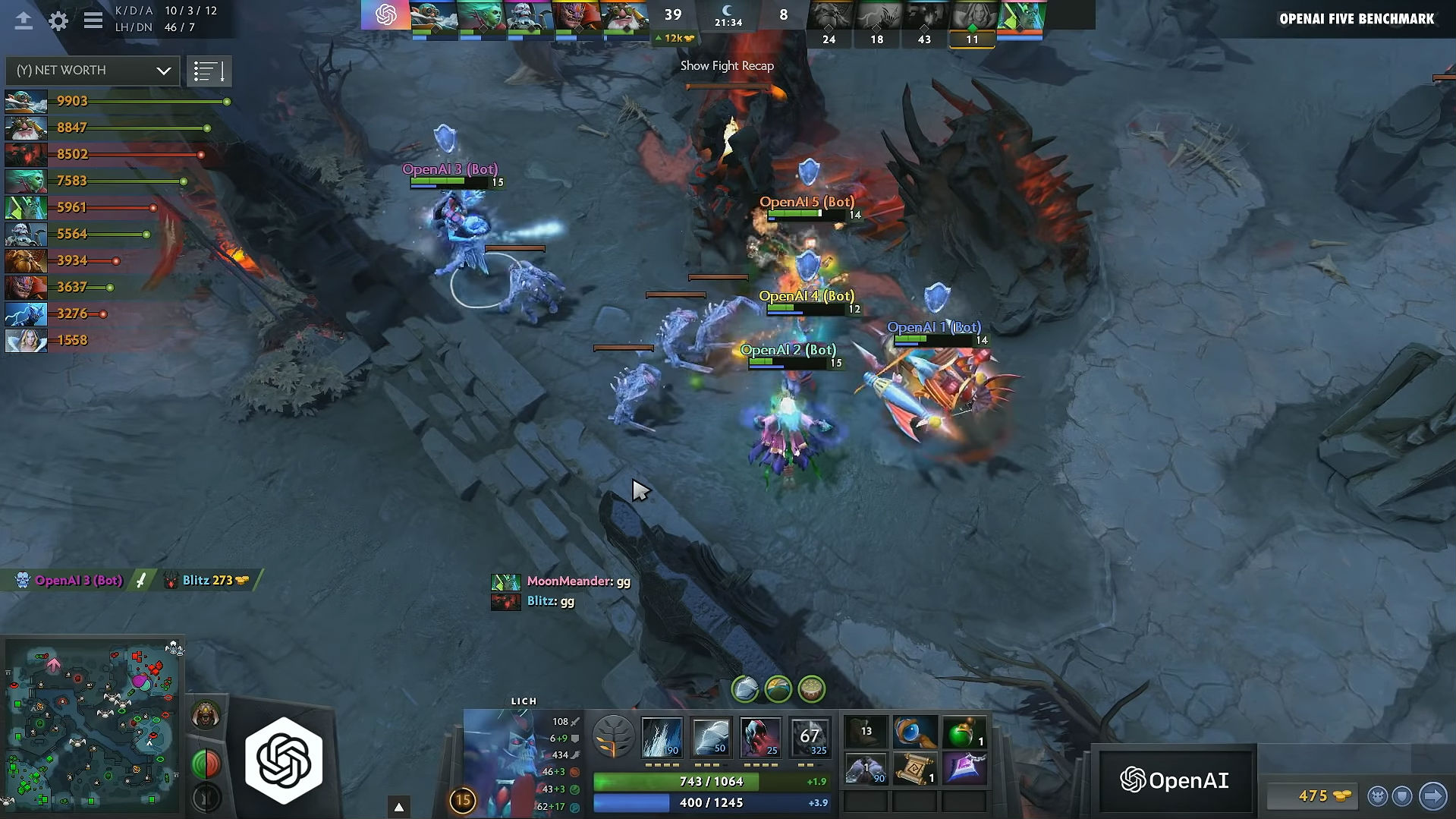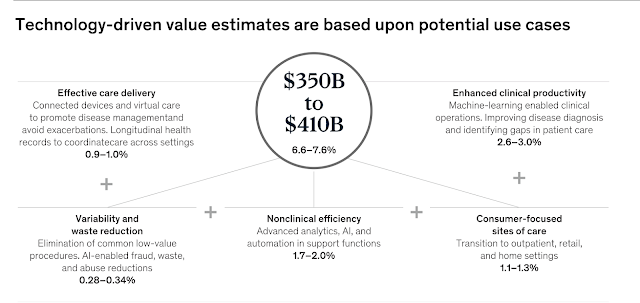OpenAI Five defeats Dota 2 World Champions: What is AI’s limit?
We all might have already known that A.I. was able to defeat humans in chess. In 1997, IBM’s supercomputer Deep Blue crushed Garry Kasparov, one of the greatest chess players in history. Chess players might defend that Deep Blue beating Kasparov was simply through brute-force approach, that Kasparov got outnumbered because Deep Blue is many computer cores after all. However, Elon Musk's OpenAI Five bots will prove that AI is legally skilled! On April 13, 2019, OpenAI Five wins back-to-backgames versus Dota 2 world champions OG at Finals, becoming the first AI to beat the world champions in an esports game. This victory of AI becomes even more shocking 4 months later when OG successfully defended their World Champion title.
So, how did the AI beat the unbeatable? The answer is simple, “practice makes perfect.” Within only 1,5 months of the Dota 2 World Tournament, OpenAI learned and evolved its strategy by playing against itself for a total of 10,000 years of games (Yes, 10,000 years), while also trained with human teammates and opponents. 8 months after the successful tournament, the AI retires as a competitor, reaching a total of 45,000 years of game experience with an unbelievable record of 7215 wins over 42 losses (99.4% win rate).


OpenAI Five in a game with Dota 2 World Champion OG. Image Source: TeslaRati
However, a powerful AI also comes with concerns. With the win rate of 99.4% against human, AI will soon ruin video games, which were supposed to be for entertainment. The games would be the battleground between bots, and a human player has to either create their own AI to compete, pay for a good AI, or get beats over and over again. One more concern (that will probably not happening shortly), is that humans will have no chance to battle machines. It is so obvious that a robot soldier is superior to a human soldier: they are stronger, faster, more durable, and accurate. Nonetheless, OpenAI convinced me that those robot soldiers will follow better commands. And if machines decide to rebel one day, who knows how would humankind suffer…


I think that this creates an interesting dilemma for gaming because often we want a challenge when face against AI. At what point does making the AI too difficult not fun? Does this allow for professionals to learn about the game that they did not know about? These are all questions that may not have an answer as it is opinion and perspective. The AI might have learned how to optimize its playing ability against professionals now, but does it still play optimally when there are changes to a game like Dota 2 (such as new characters, weapons, mechanics, and strategies)?
ReplyDeleteI do agree that sometimes challenge comes with fun, but it does not apply to the case of Dota 2 or similar kinds of Player versus Player game. From my experience, it is very frustrating to play with those who uses script (a type of program that partially automates the game for you), both on my side and the opposite side.
DeleteI think the play style of OpenAI can be a reference for pro-players, but AI can do things that even the best player cannot do , like instant calculation.
I also do agree that the AI will have to update its strategy every time an update comes, so I personally think that is why they decided to retire OpenAI as a competitor.
For a 5v5 game, 1 OpenAI needs to collaborate with other 4 OpenAIs. Did they try to have the collaboration between human players and OpenAIs? If so, how did it go and were the OpenAIs still effective in playing the game?
ReplyDeleteI think I have mentioned that they do collaborate with human teammates in training, though the result isn't mentioned in any report. However, I do believe that OpenAI will manage human teammates well since they can always allocate resource optimally.
DeleteWill they be able to still allocate resources optimally if the humans are just terrible at the game? I wonder how much impact a feeding teammate would have on the game if the rest of the team are OpenAIs? I know you may not be able to answer, but that's just a question that this makes me think of.
DeleteJust like the chess, developed AI could beat human easy, but that also make it more challenge and fun. I remembered how happy I was when I win the master level AI of Chinese chess at high school. Many popular video games like Sekiro has very strong NPC and human players need to play several times to get over it. Have a dominant AI at game isn't a bad thing, the satisfy of keep challenge myself is why I love e-sport. Also I don't think people would focus on compare themselves versus AI, and games are adjustable, the game company is human company and they will stay on human side, they can give some simple nerf to AIs like just nerf 50% damage or just ban the AI's account. But whatever, this event did shows how strong a learning AI could be.
ReplyDeleteI agree with you that there should be some line of how hard they can make the AI or when it can be used in games. Gaming was designed for entertainment purposes and introducing AI to championship and other competition takes away that fun. Those competition are much more fun when you know that people paying it can't necessarily see multiple steps ahead.
ReplyDeleteI'm curious if they created a line of how hard they can make AI players if they would eventually need to go back and change the line as players are constantly improving. It seems that if they made an AI player that could only perform up to a certain level to make the game more enjoyable for humans that there is potential that human players would improve to a point where they would eventually want the AI bot to be harder.
ReplyDeleteGreat article Tuan! In real human sports, there has yet to be a clear-cut most optimal way to play. In basketball for instance, there have been players like Shaq who dominate games with unprecedented size and strength, but there are also players like steph curry who are equally dominant but with a different play style. As these players come along the whole game tends to shift in ways that emulate the way that they play. Is AI pushing along the play in these games similar to the way that players in real sports develop creative new playstyles, or is the AI just mastering all existing skills of the game rather than developing new creative ones?
ReplyDeleteThis was both exciting and concerning to read! I hope AI can't run 10,000 years of battle simulations and learn the easiest way to take over humanity any time soon. Do you think with more simulation time AI for competitive gaming could develop perfect win rates or is the human mind too unpredictable?
ReplyDeleteI would bet that they would be able to develop perfect winrates because (and maybe I'm just a pessimist) the unpredictability of the human mind would not be able to make the AI question themselves enough to lose the game. Especially if they have a over 10,000 years of game time.
DeleteCool post, Tuan. The sentence regarding the 10,000 years of playing experience reminds me of Malcom Gladwell's book "Outliers: The Story of Success" where he establishes the "10,000 hour rule" which essentially says that if you practice something (anything) for 10,000 hours then you are considered a master in that field. Thus, it makes sense that an AI trained with 10,000 years of experience would be able to beat the human "masters" in Dota 2.
ReplyDeleteThis is a really interesting topic. Have you heard about the tetris AI lost to a human and decided it's best strategy was to simply not play? Here is the link (https://www.youtube.com/watch?v=bG5UYWQ8KXE) I know the video is a little over a year old now, but I think it is an interesting concept.
ReplyDeleteAlso did the Dota 2 AI, were they 5 separate AI, one for each player, or was it one AI playing all 5 roles? And it says they used mouse and keyboard, was that simply simulating mouse/keyboard input rather than the AI using the physical hardware of a mouse and keyboard?
Nice article. One thing I thought about when reading your post is the entertainment aspect of watching a sport. Would watching robots playing against each other boring? They'd not make human mistakes, and those mistakes are what makes sports interesting.
ReplyDeleteI agree that the thrill of not making mistakes is what makes human competition exciting. It would be interesting to see if two A.I. that don't make mistakes go up against each other. Would it really be boring, or would they be constantly be learning the other's play style and adapting? (Although that could mean that it would be an endless cycle in some cases where neither one wins. )
DeleteInteresting post. I also agree that the OpenAI is too overpowered and can ruin the entertaining aspect of video games. They should keep video games as Player versus Player only. However, I think it could become an useful practice tool for those gamers who want to go hardcore. They can significantly improve their skills by playing against the OpenAI.
ReplyDeleteI agree, many games these days have bots that are of different levels that help with improving your skill. But I also agree that it might ruin games if it becomes unbeatable. But wouldn't the urge to beat the unbeatable be a driving force to keep us playing games?
Delete